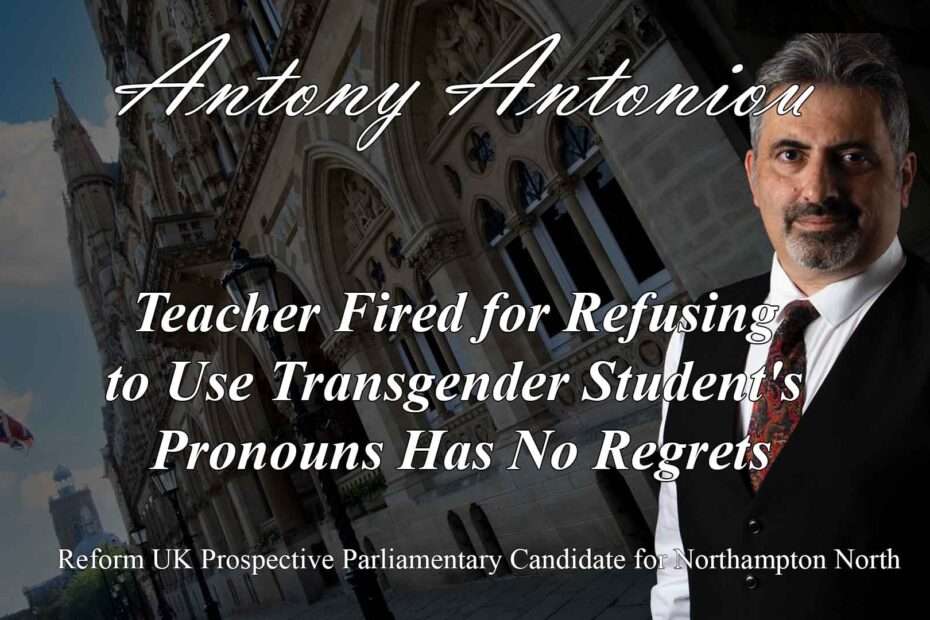Teacher Fired for Refusing to Use Transgender Student’s Pronouns Has No Regrets
In a recent case that has sparked controversy and heated debate, a teacher from Swindon has been dismissed from his position after refusing to use a transgender student’s preferred pronouns. Kevin Ressikan, who had been teaching maths for 18 years, shared his reflections on the tribunal’s decision, expressing his devastation and rejecting the claims of harassment and discrimination against the student.
The incident in question occurred at New College Swindon, where Ressikan had been employed for just over a year. It centered around a conversation he had with a transgender student, referred to as “Student A,” who was considering entering a girls’ maths competition. Ressikan recounted the exchange, stating that he had encouraged the student to participate and explained the risks associated with transitioning as best he could.
“She went away and said she’d think about it, and then she entered the girls’ competition,” Ressikan said. “So I thought, well, she had thought about it, maybe she concluded that she was a girl after all and didn’t need to be avoid.”
However, the situation took a turn in January when another student, identified as “Student B,” stayed behind after class and demanded that Ressikan refer to Student A using male pronouns. Ressikan attempted to explain his reasoning for believing that transitioning was a “bad idea,” but this conversation, along with an incident where he inadvertently wrote Student A’s previous name on a whiteboard, became pivotal moments in the tribunal’s decision.
“I didn’t do it deliberately to make a point,” Ressikan clarified about the whiteboard incident. “It’s just I’m writing girls’ names to go up in a girls’ maths competition.”
Prior to the tribunal, Ressikan had raised a safeguarding concern regarding the college’s policy of not informing parents about a student’s decision to socially transition. He expressed concerns about the lack of parental consent, the potential for self-medication with cross-sex hormones, and the student’s ability to make an informed decision.
“The college response was, ‘Our policy is not to tell parents,'” Ressikan said. “They couldn’t answer question two, couldn’t answer question three. They gave me no guidance at all – zero. So I was basically supposed to go into the class and make up my own rules as to what I was supposed to do.”
Ressikan’s stance was further solidified by the Kira Bell case, which highlighted the experimental nature of transitioning and the lack of scientific evidence behind it. He maintained that the practice is “a non-evidence-based ideological precedent which has caused and can cause serious harm.”
The consequences of Ressikan’s actions have been severe. The college referred him to the Disclosure and Barring Service (DBS), which placed him on the children’s barred list, effectively preventing him from teaching or even driving a van for a delivery company, as many require DBS clearance.
Despite the professional and personal toll, Ressikan remains steadfast in his convictions. When asked if he regrets his decision, he responded without hesitation: “No, don’t regret this at all. I would do the same thing. I would put safeguarding first.”
Ressikan’s stance highlights the ongoing debate surrounding transgender rights, parental involvement, and the role of educators in navigating these complex issues. While some applaud his commitment to safeguarding and his adherence to his principles, others argue that his actions were discriminatory and harmful to the transgender student’s well-being.
The case has reignited discussions about the balance between respecting an individual’s gender identity and addressing legitimate concerns regarding the potential risks and long-term implications of transitioning, particularly for minors. It also raises questions about the extent to which schools and institutions should involve parents in such decisions and the level of guidance and support provided to educators navigating these sensitive situations.
As the debate continues, Ressikan’s dismissal serves as a cautionary tale for teachers and a reminder of the potential consequences of challenging institutional policies, even when motivated by a desire to prioritize student safety and well-being.
The case also underscores the broader societal conversations surrounding transgender rights, highlighting the need for open and respectful dialogue, as well as clear guidelines and protocols for educational institutions to ensure the protection and support of all students, regardless of their gender identity or expression.
Summary
• Kevin Ressikan, a maths teacher with 18 years of experience, was fired from New College Swindon for refusing to use a transgender student’s preferred pronouns
• He had encouraged the transgender student (“Student A”) to enter a girls’ maths competition, but later raised safeguarding concerns about the college’s policy of not informing parents about students socially transitioning
• A second student (“Student B”) demanded Ressikan refer to Student A using male pronouns, which he refused to do
• Ressikan inadvertently wrote Student A’s previous name on a whiteboard when listing girls for the maths competition
• He cited the Kira Bell case, arguing that transitioning is an “experimental” treatment lacking scientific evidence and can cause harm
• Ressikan was referred to the Disclosure and Barring Service (DBS) and placed on the children’s barred list, preventing him from teaching again
• Despite the severe professional consequences, he stands by his actions, stating he would “do the same thing” and “put safeguarding first”
• The case has reignited debates around transgender rights, parental involvement, risks of transitioning for minors, and the guidance/support provided to educators

